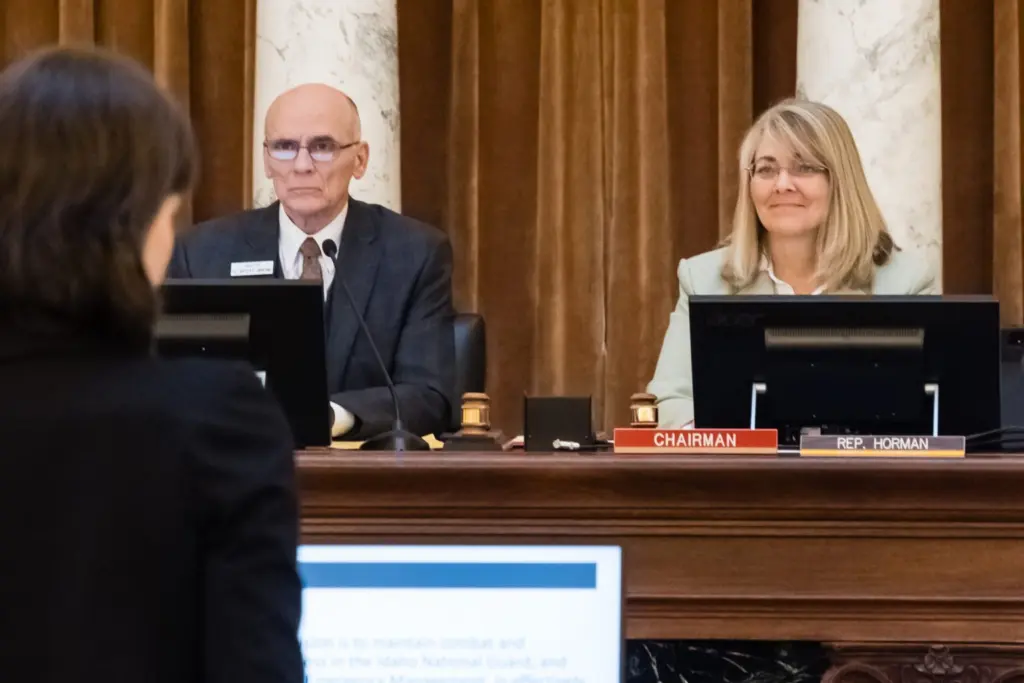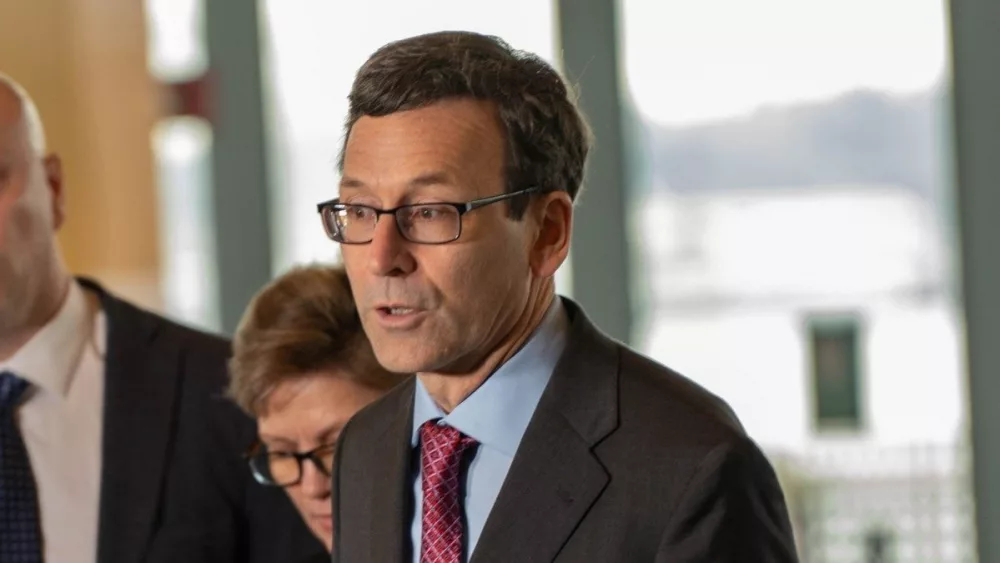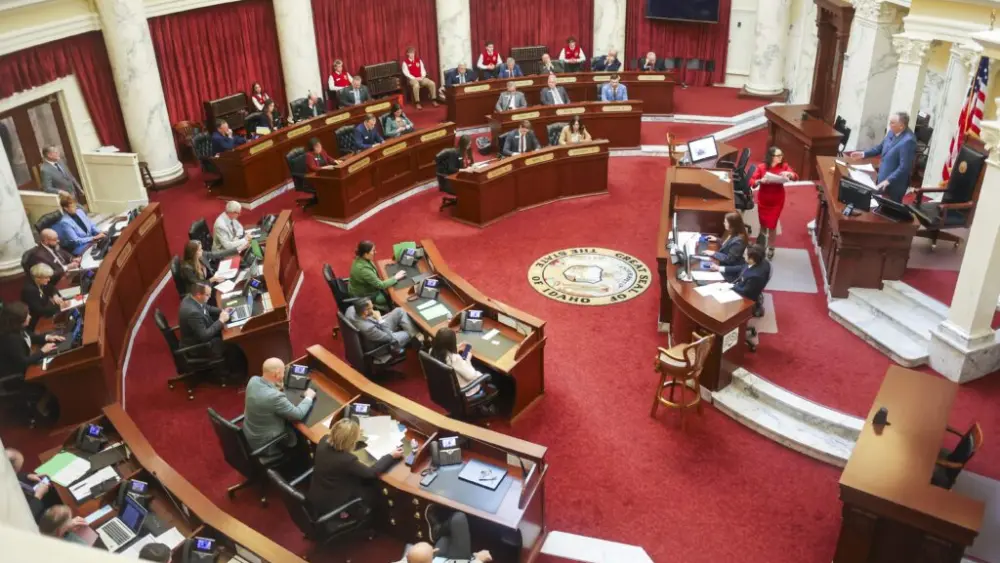BOISE, ID – The leaders of the Idaho Legislature’s powerful budget committee outlined new procedures Thursday that will guide how the committee conducts business and votes until the Legislature formally adopts written joint rules.
The Idaho Legislature’s Joint Finance-Appropriations Committee, or JFAC, had been operating without official, published rules for the last few legislative sessions. That led to public disagreements between some members of the committee, and created some confusion about what it takes to pass and advance a budget out of JFAC.
JFAC’s procedures were so confusing that at one point in March, the committee appeared to deviate from its own procedures when the committee’s two co-chairs, Sen. Scott Grow, R-Eagle, and Rep. Wendy Horman, R-Idaho Falls, did not have a written script in front of them to guide them through the process.
Almost every other Idaho legislative committee has clear consistent rules governing how it meets, how it votes and what it takes to advance a bill.
Everything that happens in JFAC is watched closely because the committee sets all of the budgets for every state agency and department. Whether it is money for Idaho State Police, pay and benefits for state employees or the budgets for Idaho’s K-12 public school system, it all goes through JFAC.
Budget committee’s co-chairs reach agreement on rules with leaders of Idaho House and Idaho Senate
On Thursday, Grow and Horman announced that they had reached agreements with House Speaker Mike Moyle, R-Star, and Senate President Pro Tem Kelly Anthon, R-Rupert, on procedures to guide JFAC. The procedures are outlined in a letter that Grow and Horman gave the other members of JFAC and the Idaho Capital Sun on Thursday.
Idaho DOGE Task Force shares potential list of state programs, agencies to combine or eliminate
JFAC is made up of 20 members – 10 each from the Idaho House of Representatives and Idaho Senate.
The biggest change is that it will no longer take six votes each from the 10 House members on JFAC and the 10 Idaho Senate members on JFAC to pass a budget.
Instead, it will take a simple majority of those members present from each legislative chamber to pass a budget.
That’s important because in 2025 – even when members were absent during a JFAC meeting – it still took six votes from each chamber. For example, if there were seven JFAC members from the Senate present and seven JFAC members from the House present, it took six “yes” votes from each chamber to pass a budget in 2025. That gave enormous power and leverage to any JFAC members who opposed budgets or budget line items because of the high bar required to pass a budget.
Under the new procedures unveiled Thursday, it would only take four votes from each chamber to pass a budget under a scenario where seven members are present from each chamber for a vote.
“So that’s going to make it easier for us to get things out of JFAC,” Grow said Thursday.
JFAC will still count votes separately between the House members and Senate members. And any budget that fails to receive a majority vote among those members present from both chambers will be considered dead. If a budget dies, it can be rewritten and brought back at a later date to be considered.
Rules outline how the committee’s co-chairs will share leadership responsibilities during the legislative session
The new JFAC procedures also specify that chairmanship of JFAC will alternate daily between the Senate Finance chairman (Grow) one day and the House Appropriations chairwoman (Horman) the next day.
In March, Moyle told the Idaho Capital Sun that one of the reasons the Idaho House did not adopt joint rules during the organizational session leading up to the 2025 legislative session is because he disagreed with Joint Rule 11, which gave the chairmanship of joint committees like JFAC to the Senate chairman.
“… We’re not going to give up the ability to set agendas and share the chair, basically, and that’s the problem,” Moyle said in March.
After meeting with Moyle and Anthon, Grow said “the preference” is to bring a formal joint rule forward for both chambers of the Idaho Legislature to vote on and adopt during the upcoming 2026 legislative session.
Grow said he and Horman wanted to distribute a letter outlining procedures now because he isn’t sure when the joint rule will come forward.
“So in the interim – because here’s the problem – we don’t want to wait because we don’t know when the joint rule will be able to come out in the session,” Grow said. “We hope it’s the first week. But in case it isn’t, this will give you a little clarification.”
Sens. Melissa Wintrow, D-Boise, and Kevin Cook, R-Idaho Falls, asked Grow and Horman if JFAC could vote on accepting the new procedures outlined in the letter.
Grow responded saying he had been told just to pass the letter out and that a formal joint rule coming forward later would “solve all of our problems.”
In the interim, Grow told Cook that the letter outlining the new procedures represents their best shot to provide some consensus.
The Idaho Legislature is not in session now, but JFAC conducted three days of budget meetings and workshops in Boise this week to prepare for the upcoming 2026 legislative session.
The 2026 legislative session is scheduled to begin Jan. 12 at the Idaho State Capitol in Boise.
Idaho Capital Sun is part of States Newsroom, a nonprofit news network supported by grants and a coalition of donors as a 501c(3) public charity. Idaho Capital Sun maintains editorial independence. Contact Editor Christina Lords for questions: info@idahocapitalsun.com.





